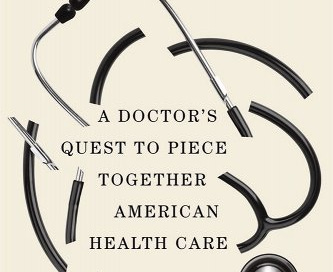'Fragmented': How our doctors see us
Ilana Yurkiewicz gives a disheartening dispatch from inside the U.S. health care system.
This post contains an affiliate link or links. If you use a link to buy a book, I may earn a small commission. You can find all the books that have been featured in this newsletter in my Bookshop store.
You don’t have to work in health care, as I do, to know that seeing a health care provider these days is often like being transported into the old tale of the seven blind men and the elephant, with you playing the elephant. If you’re lucky, you have a primary care provider who considers you and your medical history holistically. But often, you’re seeing a specialist: An emergency room doctor. A pediatrician. An optometrist. A gynecologist. Someone who sees only a fragment of you.
Ilana Yurkiewicz, a primary care doctor and clinical assistant professor of primary care and population health at Stanford, writes in her new book, “Fragmented,” that discontinuity of the patient narrative is even worse than most of us realize.
There is an assumption in an interaction between a doctor and a patient. It's so basic that it is rarely vocalized: the doctor knows the patient's story and is making decisions based on readily accessible information. But anyone who has come into contact with the healthcare system intuits an understanding of medical care as fragmented, and this intuition usually manifests as a question: "Don't my doctors talk to each other?"
No, it turns out, they mostly don’t. Among the many disheartening anecdotes Yurkiewicz shares is one of how, before handing off one patient’s care, she wracked her brains for a way to make her notes stand out as the most recent, comprehensive observations in the patient’s medical chart: Use all capital letters? Use red ink? Do both and call the next doctor? Do all three and print out the notes to hand them in person to a trustworthy go-between?
Medical records vanish as patients move from one hospital or doctor's office to another. Critical data get lost in a muddled electronic health file. Confusing payment practices block patients' ability to follow up with the same doctor who knows them. The result is that not being a doctor means working in a constant state of being partially blindfolded, grasping at bits and pieces of a patient's narrative to try to craft a coherent whole.
One patient Yurkiewicz treats is a pregnant woman who’s stunned to learn she has a lot of cancer and little hope. She’s young, unaccustomed to navigating the health care system, and uncertain in English. Yurkiewicz realizes that saving this woman’s life will depend in large part on how much of her story slips through the cracks in the system. Each of the numerous doctors taking part in her care must see her as a person with a continuous narrative, not just as whatever organ or procedure they specialize in. When Yurkiewicz happens to encounter this woman and her child a few years later, she’s struck not just by the fact that the woman is alive, but also by how much she’s changed as a patient: She speaks easily and confidently with clinic staff and she carries binders in which she’s collected her medical history. She’s taken control of her narrative.
Not every patient knows how important it is to do so. Not every patient has the resources to do so. And even the most knowledgeable and resourceful patients can still find themselves struggling to keep their stories whole. When Yurkiewicz’s father has a medical crisis, she and her sister, also a doctor, find themselves as frustrated and stymied as any of their patients. If they can’t beat the system, who can?
Yurkiewicz doesn’t offer any easy solutions, because there are none. But the other day I spotted a ray of hope: Medicare will soon begin covering patient navigation services for people with cancer. This means some patients could soon have someone to guide them through treatment, insurance and more. Someone to put the fragments of their story back together.



